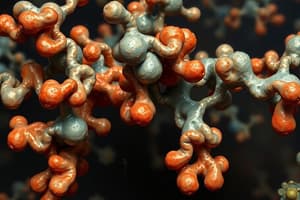Podcast
Questions and Answers
What does biochemistry primarily study?
What does biochemistry primarily study?
- The evolutionary relationships among species
- The ecological impacts of organisms on environments
- The chemical processes occurring within living organisms (correct)
- The physical structures of biological molecules
Which branch of biochemistry specifically investigates biochemical processes in humans and animals?
Which branch of biochemistry specifically investigates biochemical processes in humans and animals?
- Clinical Biochemistry (correct)
- Industrial Biochemistry
- Agricultural Biochemistry
- Molecular Biochemistry
How does biochemistry relate to physics?
How does biochemistry relate to physics?
- Biochemistry and physics operate in completely separate domains
- Biochemistry has no significant relationship with physical principles
- Biochemistry primarily focuses on chemical reactions without physical context
- Biochemistry incorporates physical principles such as thermodynamics and kinetics (correct)
Which of the following is NOT considered a key concept of biochemistry?
Which of the following is NOT considered a key concept of biochemistry?
What is primarily studied in the field of molecular biochemistry?
What is primarily studied in the field of molecular biochemistry?
What is the primary focus of neurobiochemistry?
What is the primary focus of neurobiochemistry?
Which application is associated with immunobiochemistry?
Which application is associated with immunobiochemistry?
Which of the following does NOT align with the focus of forensic biochemistry?
Which of the following does NOT align with the focus of forensic biochemistry?
What is a key significance of computational biochemistry?
What is a key significance of computational biochemistry?
Which biochemical focus area is MOST likely to address issues related to pollution?
Which biochemical focus area is MOST likely to address issues related to pollution?
Flashcards are hidden until you start studying
Study Notes
Biochemistry: Definition and Scope
- Biochemistry: the study of chemical processes in living organisms.
- Scope: encompasses biomolecules, metabolic pathways, enzyme action, and energy transformations.
Branches of Biochemistry
- Clinical Biochemistry: studies biochemical processes in humans and animals.
- Agricultural Biochemistry: applies biochemical principles to agricultural practices.
- Industrial Biochemistry: develops products and processes using biochemical principles.
- Molecular Biochemistry: explores biochemical processes at the molecular level.
Relationship to Other Sciences
- Biology: biochemistry explains biological processes.
- Chemistry: biochemistry applies chemical principles.
- Physics: biochemistry involves physical principles like thermodynamics and kinetics.
- Medicine: biochemistry underlies human health and disease.
Key Concepts and Principles
- Atomic Structure and Chemical Bonding: fundamental building blocks of molecules.
- Biomolecules: carbohydrates, lipids, proteins, and nucleic acids. These molecules form the basis of life.
- Metabolic Pathways and Energy Transformations: how organisms obtain, use, and store energy.
- Enzyme Action and Regulation: biological catalysts that speed up chemical reactions.
Subfields of Biochemistry
- Nutritional Biochemistry: focuses on the biochemical processes involved in nutrition and metabolism.
- Neurobiochemistry: studies the biochemical processes in the nervous system, including neurotransmitter synthesis, signaling pathways, and neurodegenerative diseases.
- Immunobiochemistry: examines the biochemical processes of the immune response, including antibody function and immunological disorders.
- Pharmacological Biochemistry: investigates the biochemical effects of drugs, including drug design, mechanism of action, and metabolism.
- Environmental Biochemistry: studies how environmental factors impact biochemical processes, like pollution and climate change.
- Forensic Biochemistry: uses biochemical techniques in forensic science, including DNA analysis and toxicology.
- Computational Biochemistry: applies computational methods to analyze and simulate biochemical processes, like molecular modeling.
Relationship to Other Sciences (in More Detail)
Subfields of Physics in Relationship to Biochemistry
- Biophysics: applies physical principles to biological systems, like the dynamics of molecular components.
- Thermodynamics: explains energy transformations in biochemistry, like bioenergetics of enzymatic reactions.
- Spectroscopy: uses spectroscopic techniques to analyze biomolecule structure, like investigating the molecular mechanism underlying biomolecular function.
Relationship with Medicine
- Disease Diagnosis and Treatment: biochemistry helps identify and treat disease.
- Pharmaceutical Development: biochemistry is crucial for designing and producing drugs.
- Understanding Disease Mechanisms: biochemistry helps explain how diseases develop.
Subfields of Medicine in Relationship to Biochemistry
- Pharmacology: biochemistry informs drug development and the mechanism of action of drugs.
- Pathology: biochemistry is used to understand disease mechanisms and diagnosis.
- Immunology: biochemistry studies the immune system and its responses.
Relationship with Agriculture
- Crop Improvement: biochemistry enables using genetic engineering to improve crops.
- Animal Nutrition and Feed Development: biochemistry informs the development of optimal animal feeds.
- Pest Management: biochemistry aids in the development of pesticides and pest control strategies.
Subfields of Agriculture in Relationship to Biochemistry
- Plant Biochemistry: biochemistry explores how plants grow and develop.
- Animal Nutrition: biochemistry informs animal feed development and the processes of animal nutrition.
- Pest Management: biochemistry is used to develop biochemical pesticides.
Relationship with Environmental Science
- Pollution Monitoring and Remediation: biochemistry helps monitor and clean up pollution.
- Climate Change Research: biochemistry helps understand the biochemical impacts of climate change.
- Conservation Biology: biochemistry informs efforts to conserve biodiversity.
Subfields of Environmental Science in Relationship to Biochemistry
- Environmental Toxicology: biochemistry studies the toxic effects of environmental factors on living organisms.
- Conservation Biology: biochemistry informs conservation efforts to protect species and ecosystems.
- Climate Change: biochemistry helps understand the biochemical impacts of climate change, such as shifts in species distributions and changes in metabolic pathways.
Interdisciplinary Approach
- Systems Biology: integrates biochemistry, biology, and mathematics
- Synthetic Biology: combines biochemistry, biology, and engineering.
- Bioinformatics: combines biology and computer science.
Key Theories
- Cell Theory: cells are the fundamental unit of life.
- Central Dogma: genetic information flows from DNA to RNA to proteins.
- Glycolytic Pathway: the primary pathway for glucose metabolism.
Biochemical Processes
- Photosynthesis: conversion of light energy into chemical energy.
- Cellular Respiration: conversion of chemical energy into ATP.
- Protein Synthesis: assembly of amino acids into proteins.
Applications
- Medical Research: use of biochemical principles to develop new treatments.
- Agricultural Development: application of biochemical principles to improve crop yields and develop sustainable agricultural practices.
- Synthetic Biology and Bioengineering: designing and constructing new biological systems.
- Biotechnology and Biofuels: use of biochemical processes to develop sustainable biofuels and bioproducts.
- Agricultural Biotechnology: use of biotechnology to improve crop yields and nutritional content, such as developing genetically modified crops.
Key Concepts
- Biomolecular Structure and Function: understanding the three-dimensional structure and function of biomolecules.
- Metabolic Pathways and Networks: studying the intricate network of chemical reactions within cells.
- Enzyme Kinetics and Mechanism: analyzing the rates and mechanisms of enzyme-catalyzed reactions.
- Bioenergetics and Thermodynamics: understanding energy transformations in biochemical processes.
- Cell Signaling and Regulation: studying how cells communicate and regulate their functions.
Theories and Models
- Central Dogma and Gene Expression: understanding the flow of genetic information.
- Michaelis-Menten Kinetics and Enzyme Catalysis: modeling enzyme-catalyzed reactions.
- Monod-Wyman-Changeux Model and Allosteric Regulation: understanding cooperative binding and allosteric regulation in proteins.
- Fluid Mosaic Model and Cell Membrane Structure: explaining the structure and function of cell membranes.
- Molecular Orbital Theory: understanding the electronic structure and reactivity of biomolecules.
Advanced Topics
- Systems Biology and Network Analysis: studying complex biological systems using network analysis.
- Synthetic Biology and Bioengineering: designing and building new biological systems.
- Single-Molecule Biophysics and Biophysical Methods: investigating biomolecular structure and function at the single-molecule level.
Advanced Concepts
- Structural Biochemistry: understanding the three-dimensional structure of biomolecules, like protein folding and DNA structure.
- Metabolic Flux Analysis: studying the flow of metabolites through biochemical pathways, including flux balance analysis and metabolic network modeling.
- Enzyme Dynamics and Allostery: analyzing the dynamic behavior of enzymes, including allosteric regulation and enzyme-substrate interactions.
- Biochemical Signaling and Network Biology: examing the complex signaling pathways that regulate cellular processes, including protein-protein interactions and phosphorylation cascades.
- Biophysical Chemistry and Thermodynamics: understanding the application of thermodynamic principles to biochemical processes, including free energy changes, entropy, and equilibrium constants.
General Principles
- Chemical Reactivity and Mechanism: understanding the chemical mechanisms underlying biochemical reactions, including transition-state theory and reaction kinetics.
- Biochemical Energetics and Thermodynamics: analyzing energy transformations in biochemical processes, including ATP production, redox reactions, and energy coupling.
- Acid-Base Chemistry: understanding pH and its role in biochemical processes.
- Oxidation-Reduction Reactions: understanding electron transfer and energy transformation.
- Biochemical Regulation: understanding how biochemical processes are controlled.
Studying That Suits You
Use AI to generate personalized quizzes and flashcards to suit your learning preferences.




